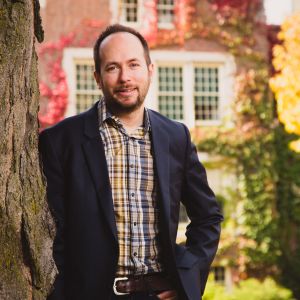Ryan M. Jones
Associate Professor of History and Coordinator of Latin American and Caribbean Studies (LACS)
Doty Hall 239
585-245-5376
jonesr@geneseo.edu
Ryan M. Jones has been a member of the Geneseo faculty since 2014, and is a specialist in the history of modern Latin America. Professor Jones is the Coordinator of Geneseo’s Latin American and Caribbean Studies program.
He is the co-editor of the recently published volume, A Global History of Sexual Science, 1880–1960, the first anthology to provide a worldwide perspective on the birth and development of the field of sexual science.

Office Hours
Curriculum Vitae
Education
Ph.D. and MA, History, University of Illinois
BA, History, Millikin University
Publications
Defeating the “Social Danger” of Homosexuality while “Forging the Fatherland”: Sexual Science and Biotypology in Mexico’s National Development, 1927–57, History of the Human Sciences, special issue “Sexual Science and Development”, 36, no. 5 (December 2023): 122–151. link
“Now I have Found Myself, and I Am Happy: Marta Olmos, Sex Reassignment, the Media, and Mexico on a Global Stage, 1952–7” Journal of Latin American Studies 55, no. 3 (August 2023): 455–489. link
“Check Your Narratives: Essentials for Understanding Latin American History, 1400–Present” in Melanie Medeiros and Jennifer Guzman, eds. Insights on Latin America and the Caribbean: An Ethnographic Reader (Toronto: University of Toronto Press, March 2023)
Veronika Fuechtner, Douglas E. Haynes, and Ryan M. Jones, editors, A Global History of Sexual Science, 1880–1960 (University of California Press, 2017)
“Mexican Sexology and Male Homosexuality: Genealogies and Global Contexts, 1860–1957 in A Global History of Sexual Science, edited by Veronika Fuechtner, Douglas Haynes, and Ryan M. Jones, 232–257
¡Viva the Queer Zapata! The Sexual Politics of Defining Mexican Identity and Icons in Fabián Cháirez’s ‘La Revolución’” https://nursingclio.org/2020/03/25/viva-the-queer-zapata-the-sexual-politics-of-defining-mexican-identity-and-icons-in-fabian-chairezs-la-revolucion/ Nursing Clio, March 25, 2020
Awards
2022 SUNY Chancellor’s Award for Excellence in Teaching
SUNY system-wide award recognizing “consistently superior teaching in keeping with the State University’s commitment to providing its students with instruction of the highest quality”
2019 Professor Recognition Award for “Exceptional Dedication” to Geneseo Students, presented by Student Affairs Council
2017 Faculty Recognition Award, for “Most Influential Teacher” to Student-Athlete
2015 Honorable Mention, “Honoring Teachers” Faculty Award, SUNY Geneseo,
Nominated by students for exceptional contributions to student learning
Affiliations
American Historical Association
Latin American Studies Association
Urban History Association
Research Interests
-
Latin American History
- Professor Jones is a specialist in Modern Latin American history, particularly in Mexico, Argentina, and Cuba. His thematic research and teaching interests include Gender and Sexuality, Masculinity, Citizenship, Visual Culture/Photography, Pacific Worlds, and Histories of Science and Medicine. He is currently revising a book manuscript entitled Erotic Revolutions that investigates Mexican history through the lens of masculinity, male homosexuality, and citizenship between 1870 and 1968.
